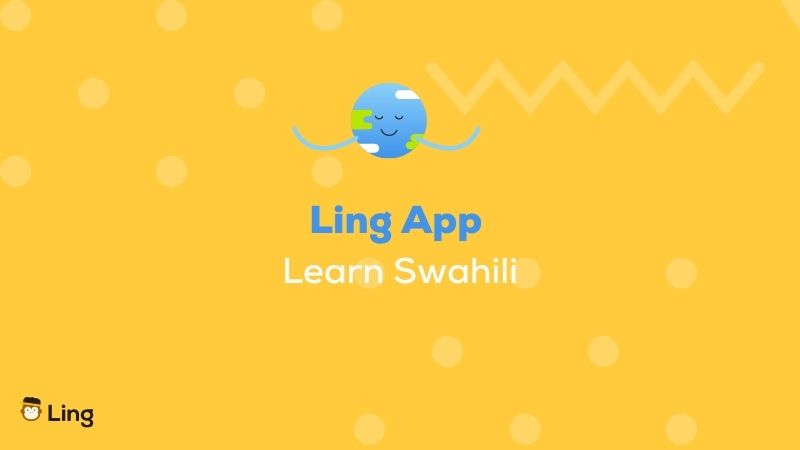Swahili, a vibrant and widely spoken language across East Africa, is known for its animate nouns and intricate verb conjugation system that adds depth and nuance to communication. At the heart of this linguistic richness lie Swahili verbs, the dynamic elements that convey actions, states, and time.
Understanding Swahili verbs opens the door to a world of expression, allowing speakers to paint vivid pictures of the present, relive the past, and envision the future.
These Swahili verbs aren’t going anywhere! But if you want to start your adventure in learning Swahili, then let’s start it now!
Swahili Verbs: Primary Tenses
The three primary tenses—present, past, and future—are skillfully crafted through the use of specific prefixes like the subject prefix and object prefix, each bringing a distinct temporal flavor to the narrative. You must have already seen the work of suffixes in the article on Swahili noun class. From the graceful dance of the present tense’s “-na-” prefix to the echo of the past tense’s “-li-” prefix and the anticipation carried by the future tense’s “-ta-” prefix, Swahili verbs carry the very essence of time itself.

Swahili Verb Rules
When dealing with Swahili verbs, there are some rules apply. Let’s take a look:
1. Conjugation By Tense And Subject
Swahili verbs are conjugated based on tense (present, past, future) and subject (Swahili pronoun). The verb prefixes change to match both the tense and subject. For example, “naenda” (I am going) changes to “unaenda” (you are going), and so on.
2. Prefixes For Tenses
- Present tense: Prefix “-na-“
- Past tense: Prefix “-li-“
- Future tense: Prefix “-ta-“
3. Subject Concord
Swahili verbs must agree with the subject in terms of gender and number. Whether it is a positive subject concord or a negative one, prefixes are used depending on the subject; a singular will have a singular prefix and of course, a plural subject will have a plural prefix.
4. Infinitive Verbs and Stems
Infinitive verbs (base form) are used to derive stems, which are then conjugated according to tense and subject. For example, “enda” (to go) becomes “naenda” (I am going) in the present tense.
5. Passive Voice
The passive voice is formed by adding the prefix “wa-” before the verb stem. It indicates that the action is being done to the subject rather than by the subject.

Table Of Swahili Verbs
Now let’s look at how the rule applies. Here are examples of Swahili verbs with different tenses.
| English Words | Swahili words | Present Tense | Past Tense | Future Tense |
|---|---|---|---|---|
| Go | Enda | A-na-enda (is going) | A-li-enda (went) | A-ta-enda (will go) |
| Sing | Imba | A-na-imba (is singing) | A-li-imba (sang) | A-ta-imba (will sing) |
| Write | Andika | A-na-andika (is writing) | A-li-andika (wrote) | A-ta-andika (will write) |
| Eat | Kula | A-na-kula (is eating) | A-li-kula (ate) | A-ta-kula (will eat) |
| Dance | Cheza | A-na-cheza (is dancing) | A-li-cheza (danced) | A-ta-cheza (will dance) |
| Sleep | Lala | A-na-lala (is sleeping) | A-li-lala (slept) | A-ta-lala (will sleep) |
| Read | Soma | A-na-soma (is reading) | A-li-soma (read) | A-ta-soma (will read) |
| Talk | Ongea | A-na-ongea (is talking) | A-li-ongea (talked) | A-ta-ongea (will talk) |
| Play | Cheza | A-na-cheza (is playing) | A-li-cheza (played) | A-ta-cheza (will play) |
| Learn | Jifunza | A-na-jifunza (is learning) | A-li-jifunza (learned) | A-ta-jifunza (will learn) |
| Travel | Safiri | A-na-safiri (is traveling) | A-li-safiri (traveled) | A-ta-safiri (will travel) |
| Cook | Pika | A-na-pika (is cooking) | A-li-pika (cooked) | A-ta-pika (will cook) |
| Buy | Nunua | A-na-nunua (is buying) | A-li-nunua (bought) | A-ta-nunua (will buy) |
| Study | Jifunza | A-na-jifunza (is studying) | A-li-jifunza (studied) | A-ta-jifunza (will study) |
| Watch | Tazama | A-na-tazama (is watching) | A-li-tazama (watched) | A-ta-tazama (will watch) |
| Listen | Sikiliza | A-na-sikiliza (is listening) | A-li-sikiliza (listened) | A-ta-sikiliza (will listen) |
Sentences With Swahili Verbs
Take a look at some examples of sentences using the Swahili verbs in different tenses from the table.
1. Present Tense
| English | Swahili |
|---|---|
| She/he is going to school every day. | A-na-enda shule kila siku. |
| She/he is singing a beautiful song. | A-na-imba wimbo mzuri. |
2. Past Tense
| English | Swahili |
|---|---|
| She/he sang at the music festival. | A-li-imba katika tamasha la muziki. |
| She/he went to the market yesterday. | A-li-enda sokoni jana. |
3. Future Tense
| English | Swahili |
|---|---|
| She/he will sing a new song at the concert. | A-ta-imba wimbo mpya kwenye tamasha. |
| She/he will go to the meeting tomorrow. | A-ta-enda kwenye mkutano kesho. |
Some more examples of Swahili verbs are found below.
| English Sentences | Swahili Sentences |
|---|---|
| She/he is having dinner. | A-na-kula chakula cha jioni. |
| She/he is playing soccer. | A-na-cheza mchezo wa mpira. |
| She/he is sleeping deeply. | A-na-lala usingizi mzito. |
| She/he is reading an exciting book. | A-na-soma kitabu cha kusisimua. |
| She/he speaks many languages. | A-na-ongea lugha nyingi. |
| She/he is learning a new language. | A-na-jifunza lugha mpya. |
| She/he is traveling to distant countries. | A-na-safiri kwenda nchi za mbali. |
| She/he is cooking delicious food. | A-na-pika chakula kitamu. |
Wrapping Up Swahili Verbs
Verbs stand as the backbone of any language, and this significance is particularly pronounced in the Swahili language. Swahili verbs play a pivotal role in conveying not only words and actions that enrich communication. They hold the power to paint vivid scenes and capture the essence of experiences. The importance of verbs in the Swahili language can be highlighted through several key aspects.
In the broader context, Swahili verbs serve as bridges of connection among diverse communities. As a lingua franca across East Africa, Swahili facilitates communication among people from different linguistic backgrounds, and verbs are the fundamental tools that enable this cross-cultural dialogue.
In conclusion, Swahili grammar, Swahili prepositions, and verbs stand as a testament to the language’s vitality, depth, and enduring relevance in the modern world. But don’t forget the importance of learning Swahili adverbs too!
Is Swahili hard to learn? Not if you take your time to memorize some of the words. There are tons of lessons to explore in this beautiful language!

Use Ling To Learn Swahili Words
Are you interested in learning the Swahili language? How about considering the Ling app? The lessons are presented in bite-sized modules, making it easy to fit learning into busy schedules. This approach ensures gradual progress and a sense of accomplishment.
One of the standout benefits of the Ling app is its focus on real-life language applications. Learners are exposed to practical conversations, dialogues, and vocabulary relevant to everyday situations. Learners can also listen to native speakers, repeat phrases, and compare their pronunciation. This immersive audio-visual approach helps users develop accurate accents and intonation, leading to more confident and effective communication.
And saving the best for last, with the Ling app, learners have the flexibility to study Swahili anytime and anywhere. The app is available on mobile devices, allowing users to learn during commutes, breaks, or any spare moments.
Whether you are learning nouns, Swahili noun classes, monosyllabic verbs or a verb root, Swahili adjectives, grammar, or just eager to learn languages, the Ling app is an ideal companion to help you learn well. Find out for yourself – download the app from the App Store or Google Play Store today! You can also find 60+ other languages on Ling.



































































